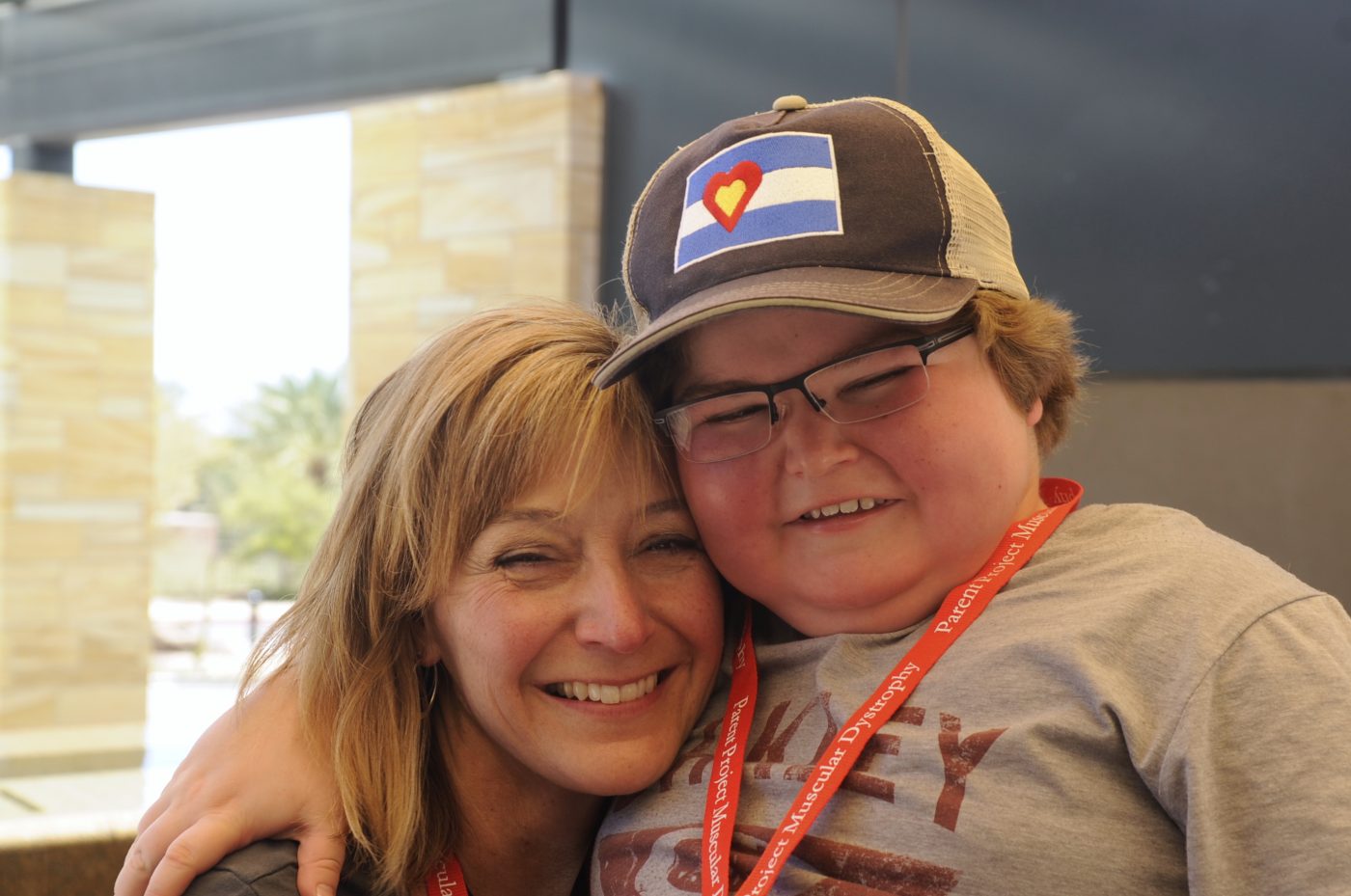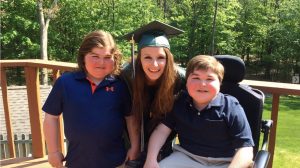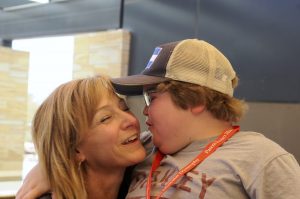Michigan Mom Who Lost One Son to Duchenne Works to Give Fresh Hope to the Other

DeAnne Friar and her son, Kyle, who has Duchenne. (Photo by Larry Luxner)
Caring for a son with Duchenne muscular dystrophy is hard enough. Imagine how much harder it is when you’ve lost your other son to the same disease.
That’s the uncertainty DeAnne Friar of Grand Rapids, Michigan, lives with day after day.
Her first child, 20-year-old Colleen, attends Western Michigan University in Kalamazoo. The middle child, Kevin, died of Duchenne about four months ago at the age of 18. Her youngest, Kyle, is 14. He was diagnosed with the genetic neuromuscular disease in November 2004, shortly after his birth and less than a year after his older brother’s diagnosis.
“I thought we were done having children,” Friar said. “Then Kyle was born and we found out that not only was it a boy, but that he also had Duchenne.”
Friar underwent genetic testing the December before Kyle’s birth, and was told she was not a carrier.
“Throughout my pregnancy, I was concerned, yet it wasn’t a constant concern,” she said. “Fast-forward to February of this year. I went through a study at Nationwide Children’s Hospital in Columbus, Ohio. They redid my tests and confirmed that I am a carrier.”
Until she retired early in June 2017, Friar, 51, was working full-time as a speech therapist at Forest Hills Public Schools. Mike, her husband, works in real estate.
Same disease, different personalities
Friar talked about her life in an interview early last month in Arizona, where Parent Project Muscular Dystrophy (PPMD) was wrapping up its 2018 annual conference.
“It’s so overwhelming when you sit back and look at it. They were very close,” she said, with tears in her eyes. “It’s exhausting as a parent to have two children with Duchenne. I would put my kids to bed at 10 p.m. My morning started at 4:45 a.m., when I would get up, and get myself ready for work. They had to be at school by 7:00.”
Unlike his younger brother, Kevin would not have been comfortable attending the PPMD meeting and seeing other Duchenne boys scooting around in electric wheelchairs, Friar said.
“Kevin kept the disease to himself. He did not like to share information. He wanted to stay as far away from this as possible. I think it was denial,” she said. “Kyle loves to come to something like this and be with kids like him. Kyle’s a fighter. He’s a go-getter and an adventurer.”
On his 16th birthday, Kevin went into a local Ace Hardware — a store he knew well — in his wheelchair and told the manager he wanted a job, despite his inability to walk. He was hired. It was part of his struggle to “be a normal kid,” said his mother, even though Kevin suffered from obsessive-compulsive disorder (OCD) — a common byproduct of Duchenne.
“Kevin was the kind of kid who would watch those other kids who had DMD with breathing machines and say ‘I will never wear a machine like that’,” she said. “He was in a power chair, and frustrated because he was losing strength in his hands.”
But as Kevin entered his senior year of high school, his OCD got worse.
Family struggle continues
“This anger he had toward his disease, it really built up anxiety. He would say the only control he had in his life was telling people what to do,” she said. “For the last six to nine months, I would have to wash his hands over and over again. That was his control.”
On Easter Sunday, during a badly needed family vacation in Destin, Florida, Kevin fell out of a chair and hit his head while taking a shower.
“He was naked in the shower and I was yelling for help. My mother-in-law picked him up, he started to moan and then he went unconscious and never woke up,” Friar said. “We took him to Fort Walton Beach Medical Center and spent more of the night doing CT scans and MRIs. His heart was giving out, and I’m sure his anxiety played into it. He passed away at 7:22 the next morning.”
Back in Michigan, more than 700 people attended his funeral — yet the Friar family knew the struggle wasn’t over. Both DeAnne and Mike continued fundraising efforts to find a cure for Duchenne through their annual Friar Fight, staged the last Saturday in July.
They’ve raised about $50,000 a year for the cause, and this year, Kyle happily participated in the Friar Fight Golf Outing. The family’s upcoming GR-0.1K race takes place in November in Grand Rapids.
“Kyle is much more accepting of his disease. He’s motivated to do his exercises and use whatever machines he has to in order to function,” she said, recalling that Kevin once gave his younger brother some advice about dealing with inquisitive schoolmates: “If you say it really fast — like Duchennemusculardystrophy — kids won’t ask you again what you have.”
Until he broke his leg on April 15, about two weeks after his brother’s death, Kyle could walk with assistance. The teenager has been using a wheelchair for nearly four years now because he tires easily, although he’s still able to take a few steps with the help of an adult.
Kyle Friar: ‘I can do everything’
“I can do everything, but I do it a little differently,” he told Muscular Dystrophy News Today. “I ski with my friends, but I’m in a sitting ski. It’s two skis next to each other, and a chair on top. I also swim every morning for about an hour.”
Kyle is on seven medications, including the corticosteroid Emflaza (deflazacort), vitamin D, and licinopril, an ACE inhibitor. Both he and his late brother began taking Emflaza at the age of 4, with immediate positive effects. Kyle added that he’s tried to get into clinical trials, but so far has not been accepted for one reason or another.
Financially, the Friar family appears to be managing despite the high cost of raising two boys with Duchenne.
“We’ve been really fortunate,” she said. “When I was working for the school system, we had great insurance. Kyle and Kevin were both eligible for Michigan Medicaid waivers, too. But more recently, the boys’ Emflaza was denied because our regular Blue Cross insurance wouldn’t cover it. They completely flat-out denied us. But we had secondary Medicaid insurance which did cover the treatment.”
Meanwhile, Friar counts her blessings — difficult as that may be sometimes.
“I look around and I know we are not the norm. My husband and I have been saving for years, knowing we’d have to live in a house that would be handicapped-accessible,” she said. “Some people save for college. We saved to make our house accessible for our family. It was the best decision we could have made.”








